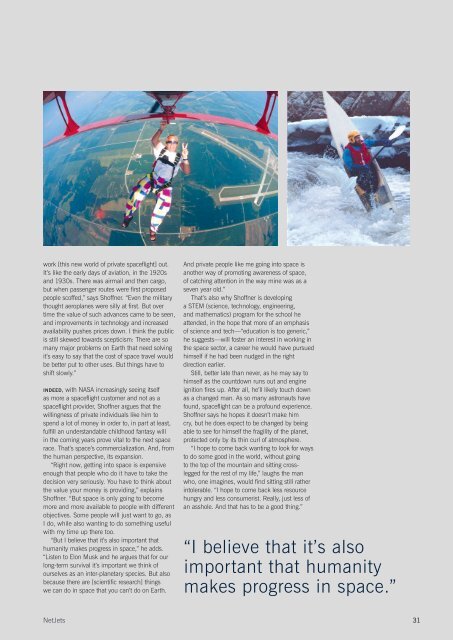Create successful ePaper yourself
Turn your PDF publications into a flip-book with our unique Google optimized e-Paper software.
work [this new world of private spaceflight] out.<br />
It’s like the early days of aviation, in the 1920s<br />
and 1930s. There was airmail and then cargo,<br />
but when passenger routes were first proposed<br />
people scoffed,” says Shoffner. “Even the military<br />
thought aeroplanes were silly at first. But over<br />
time the value of such advances came to be seen,<br />
and improvements in technology and increased<br />
availability pushes prices down. I think the public<br />
is still skewed towards scepticism: There are so<br />
many major problems on Earth that need solving<br />
it’s easy to say that the cost of space travel would<br />
be better put to other uses. But things have to<br />
shift slowly.”<br />
INDEED, with NASA increasingly seeing itself<br />
as more a spaceflight customer and not as a<br />
spaceflight provider, Shoffner argues that the<br />
willingness of private individuals like him to<br />
spend a lot of money in order to, in part at least,<br />
fulfill an understandable childhood fantasy will<br />
in the coming years prove vital to the next space<br />
race. That’s space’s commercialization. And, from<br />
the human perspective, its expansion.<br />
“Right now, getting into space is expensive<br />
enough that people who do it have to take the<br />
decision very seriously. You have to think about<br />
the value your money is providing,” explains<br />
Shoffner. “But space is only going to become<br />
more and more available to people with different<br />
objectives. Some people will just want to go, as<br />
I do, while also wanting to do something useful<br />
with my time up there too.<br />
“But I believe that it’s also important that<br />
humanity makes progress in space,” he adds.<br />
“Listen to Elon Musk and he argues that for our<br />
long-term survival it’s important we think of<br />
ourselves as an inter-planetary species. But also<br />
because there are [scientific research] things<br />
we can do in space that you can’t do on Earth.<br />
And private people like me going into space is<br />
another way of promoting awareness of space,<br />
of catching attention in the way mine was as a<br />
seven year old.”<br />
That’s also why Shoffner is developing<br />
a STEM (science, technology, engineering,<br />
and mathematics) program for the school he<br />
attended, in the hope that more of an emphasis<br />
of science and tech—“education is too generic,”<br />
he suggests—will foster an interest in working in<br />
the space sector, a career he would have pursued<br />
himself if he had been nudged in the right<br />
direction earlier.<br />
Still, better late than never, as he may say to<br />
himself as the countdown runs out and engine<br />
ignition fires up. After all, he’ll likely touch down<br />
as a changed man. As so many astronauts have<br />
found, spaceflight can be a profound experience.<br />
Shoffner says he hopes it doesn’t make him<br />
cry, but he does expect to be changed by being<br />
able to see for himself the fragility of the planet,<br />
protected only by its thin curl of atmosphere.<br />
“I hope to come back wanting to look for ways<br />
to do some good in the world, without going<br />
to the top of the mountain and sitting crosslegged<br />
for the rest of my life,” laughs the man<br />
who, one imagines, would find sitting still rather<br />
intolerable. “I hope to come back less resource<br />
hungry and less consumerist. Really, just less of<br />
an asshole. And that has to be a good thing.”<br />
“I believe that it’s also<br />
important that humanity<br />
makes progress in space.”<br />
NetJets<br />
31


















